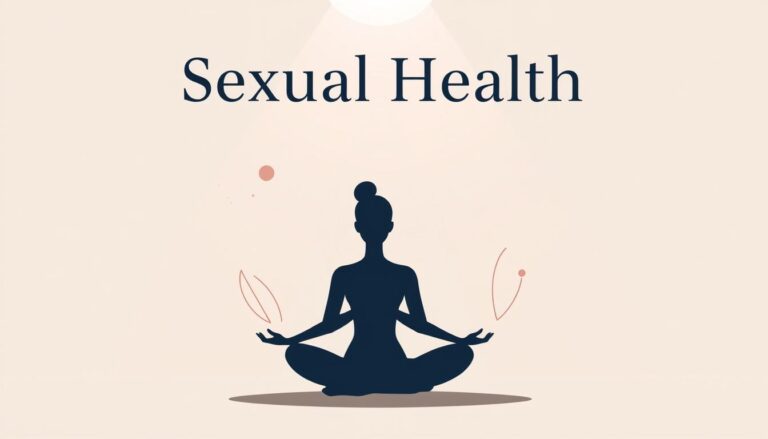Mental and Sexual Health : 7 Ways to Boost Intimacy
Table of Contents
Intimacy is more than just physical touch. It’s about being emotionally open, trusting, and understanding each other deeply. This makes relationships truly special. Your mental and sexual health are closely linked, forming a strong base for real connection.
Today’s relationships focus on how our minds and bodies work together. Studies show that emotional closeness is key to happy sex lives. By trying seven powerful strategies, you can reach a deeper level of connection and understanding with your partner.
When we understand how mental and sexual health connect, we can build stronger, more meaningful relationships. These methods go beyond simple advice. They explore the deep psychological connections that hold partners together.
Key Takeaways
- Mental health directly influences sexual satisfaction
- Emotional vulnerability strengthens intimate connections
- Communication is crucial for relationship intimacy
- Shared experiences enhance relationship bonds
- Psychological well-being supports sexual health
- Trust and empathy are fundamental to intimacy
- Personal growth contributes to relationship quality
Understanding the Connection Between Mental and Sexual Health
Your mental health is key to your sexual well-being and relationships. Mental health and sex are closely linked. This connection affects your emotional smarts and how you connect with others.
Studies show a strong link between the mind and body. About 50% of people with sex issues also have mental health problems like depression or anxiety. These issues can really affect your sex drive, how well you perform, and how happy you are in your relationships.
Psychological Well-being and Sexual Function
Mental health has a big impact on your sex life:
- Stress and anxiety can lower your sex drive
- Depression can make you less interested in sex
- Emotional trauma can block closeness
- Changes in brain chemicals can affect how you respond to sex
Impact on Intimate Relationships
Your mood greatly affects your relationships. Psychological well-being helps you connect, talk, and keep healthy bonds. But, when mental health issues pop up, they can make it hard to talk and feel close.
Breaking Down the Mind-Body Connection
It’s important to understand how mental and sexual health are connected. Therapy, like cognitive-behavioral therapy, can help 50-70% of people with mental issues that affect their sex life.
Sexual health is not just physical—it’s a holistic integration of emotional, mental, and social well-being.
By focusing on your emotional intelligence and mental health, you can have more rewarding and connected relationships.
Building Strong Communication Foundations
Communication is key to healthy relationships and sexual intimacy. It’s not just talking; it’s about making deep emotional connections. This understanding is crucial between partners.
Improving communication takes effort and dedication. Being able to express your needs, listen well, and create a safe space can change your relationships. It can make them more intimate and fulfilling.
- Practice active listening techniques
- Express personal boundaries clearly
- Share vulnerabilities without judgment
- Use non-verbal communication effectively
Counseling services stress the need for open talk. A study with 142 couples showed that better sexual talk makes relationships happier. When partners talk well, they feel closer and enjoy intimacy more.
| Communication Aspect | Impact on Relationships |
|---|---|
| Verbal Expression | Increases mutual understanding |
| Non-Verbal Cues | Enhances emotional connection |
| Active Listening | Builds trust and empathy |
Valuing honest and respectful talk builds trust. Emotional safety lets partners share openly without fear. Remember, good communication grows with practice, patience, and respect for each other.
Fostering Emotional Connection for Better Intimacy
Emotional intimacy is key to deep, meaningful relationships. It creates a strong bond that goes beyond physical attraction. This bond lets partners truly understand and support each other.
Your emotional intelligence is crucial for a strong bond. Studies show that couples with high emotional intimacy are happier and have less conflict.
Creating Safe Spaces for Vulnerability
Building a safe emotional space takes effort. Here are some tips:
- Practice non-judgmental listening
- Validate your partner’s feelings
- Respect personal boundaries
- Show genuine empathy
Developing Trust and Understanding
Trust starts with open communication. Couples who share their experiences build stronger bonds. Emotional safety lets partners be their true selves.
Practicing Active Listening
Active listening boosts emotional intimacy. Here are some techniques:
- Maintain eye contact
- Reflect back what you’ve heard
- Ask clarifying questions
- Avoid interrupting
Emotional intimacy means feeling heard, understood, and valued in your relationship.
Focus on emotional connection to improve your relationship. This creates a deeper bond that supports both partners’ growth and well-being.
Physical Touch and Non-Sexual Intimacy
Physical intimacy is more than just sex. It’s about building deep connections through gentle touch. This touch strengthens emotional bonds. Studies show that non-sexual touch is key to happy relationships and personal happiness.
Your body needs touch to feel connected. Affectionate physical interactions lower stress and bring people closer. Scientists have found many benefits of non-sexual touch:
- Reduces stress hormone levels
- Increases feelings of safety
- Strengthens emotional connection
- Promotes psychological well-being
Self-care through touch can change your relationship. Here are some non-sexual ways to be intimate:
- Holding hands during walks
- Cuddling while watching movies
- Giving each other gentle massages
- Hugging for at least 20 seconds
- Sleeping while touching
Touch interventions have shown great results. Studies with over 13,000 people found touch improves sleep, reduces anxiety, and lowers blood pressure. By focusing on non-sexual touch, you build trust and safety in your relationship.
Physical touch is a powerful language of love that speaks directly to the heart.
Intimacy isn’t just about big gestures. Small, regular moments of touch can greatly improve your relationship and your well-being.
To get better results, you can benefit from the benefits of this nutritional supplement
Exploring New Experiences Together
Relationships need new things and shared adventures. Trying new experiences can make your bond stronger and bring back the spark. It’s a great way to grow closer and keep your relationship exciting.
Couples who try new things are happier together. Studies show that sharing experiences can make your bond stronger. It also helps you feel closer emotionally.
Adventure and Novel Activities
- Try unexpected date nights that challenge your comfort zone
- Take spontaneous weekend trips
- Learn a new skill together
- Attend workshops or classes that interest both partners
Trying unique experiences can make you 40% happier together. These moments create memories and deepen your connection.
Sharing Personal Stories and Memories
Being open is important for a strong bond. Sharing your stories makes a safe space for real connection. Talking openly can make you 30% happier together.
Creating Shared Goals
| Goal Type | Potential Impact |
|---|---|
| Personal Development | Mutual Support and Growth |
| Financial Planning | Shared Future Vision |
| Health and Wellness | Collaborative Well-being |
Having shared goals makes you a team. It brings you closer and helps you understand each other better. This teamwork makes your bond stronger.
The Power of Foreplay and Anticipation
Foreplay is key in sexuality education, making intimate moments more than just physical. Studies show that 75% of couples who enjoy foreplay feel more sexually satisfied. It’s not just a start to sex; it’s a mix of emotions and physical touch.
Here are some important points about foreplay:
- Peak sexual arousal happens between 10-30 minutes of closeness
- More than 70% of female orgasms come from clitoral touch
- Foreplay makes natural lubrication and sensitivity better
Anticipation is big in making sex exciting. Couples who send sexy texts see a 30% boost in wanting to be intimate. Building sexual tension is a daily thing, not just in bed.
| Foreplay Benefit | Percentage Impact |
|---|---|
| Increased Sexual Satisfaction | 75% |
| Emotional Connection | 60% |
| Arousal for Women | 70% |
Foreplay is more than physical touch; it’s a deep conversation between partners. By talking about what you want, being open, and building anticipation, you can make sex better.
Managing Stress and Anxiety for Better Sexual Health
Stress and anxiety can really hurt your mental and sexual health. They make it hard to feel close to others. It’s important to know how our minds affect our sex lives.
Long-term stress can really mess with your sex life. Studies say up to 52% of people worldwide have trouble getting an erection. And 37% of them also deal with anxiety. Stress hormones can even make it harder to get excited or perform.
Mindfulness Techniques for Intimacy
Mindfulness can change how you think about sex. Here are some good ways to start:
- Daily meditation to calm down
- Breathing exercises before getting intimate
- Body scan practices to feel more connected
- Guided relaxation techniques
Stress-Relief Practices for Couples
Working together to manage stress can make your relationship stronger. Doing things together can help you both relax and feel closer.
| Activity | Stress Reduction Benefit |
|---|---|
| Partner yoga | Improves physical connection |
| Joint exercise | Releases endorphins |
| Couples meditation | Enhances emotional synchronization |
Building Emotional Resilience
Being emotionally strong is crucial for handling stress and keeping your sex life healthy. Regular exercise, enough sleep, and talking openly can really help your mental and sexual health.
Good communication and understanding each other are the bases of a healthy, stress-free relationship.
If stress keeps messing with your sex life, getting help is a good idea. Cognitive behavioral sex therapy and counseling can offer tailored ways to deal with anxiety and boost your connection with your partner.
Exercise and Physical Health Benefits

Physical activity is a powerful tool for enhancing your reproductive health and self-care practices. Regular exercise offers numerous benefits that extend far beyond physical fitness. It directly impacts your sexual wellness and overall well-being.
Exercise provides remarkable advantages for your body and intimate life. Research shows that consistent physical activity can significantly improve sexual function and boost confidence. By engaging in regular workouts, you can:
- Increase blood circulation
- Enhance stamina and endurance
- Reduce stress levels
- Improve body image
- Boost hormone production
Different types of exercise contribute uniquely to reproductive health. Cardiovascular activities like running, swimming, and cycling can improve sexual performance by increasing energy and reducing fatigue. Strength training helps build muscle tone and increases testosterone levels, which can enhance libido.
| Exercise Type | Sexual Health Benefits | Recommended Frequency |
|---|---|---|
| Cardio | Improves endurance | 30 minutes, 5 times/week |
| Strength Training | Increases testosterone | 2-3 times/week |
| Yoga | Enhances flexibility | 3-4 times/week |
Mental health benefits are equally impressive. Physical activity releases endorphins, reducing anxiety and improving mood. Studies indicate that just 30 minutes of moderate exercise can lower depression risk by 26% and enhance cognitive function.
By prioritizing exercise as part of your self-care practices, you’re investing in both physical and reproductive health. Start small, stay consistent, and watch your overall wellness transform.
Seeking Professional Support When Needed
Knowing when to ask for help is key for your mental and sexual health. Many face issues that need expert counseling. If you’re dealing with sexual or mental health problems, getting professional help can change your life.
There are many types of professional support for your sexual and mental health:
- Therapists specializing in trauma support
- Sex therapists and sexologists
- Medical doctors focusing on sexual health
- Couples counseling experts
Sexual health issues can really affect your life. Problems like erectile dysfunction, low libido, or pain during intimacy often need a professional’s help. Mental health experts can help find the root of these problems.
Here are some important resources for help:
- National Sexual Assault Hotline: 800-656-HOPE (4673)
- NAMI Helpline: 1-800-950-NAMI (6264)
- 988 Suicide & Crisis Lifeline: Available 24/7
Looking for counseling doesn’t mean you’re weak. It shows you’re strong and ready to grow. Experts can give you specific advice to deal with tough emotional and sexual issues. They offer support for trauma and help improve your mental and intimate health.
Remember, your mental and sexual health are connected. Professional help can unlock a more fulfilling life.
Self-Care Practices for Sexual Wellness
Your sexual wellness is closely tied to self-care that boosts your mental health. By using a wide range of strategies, you can improve your intimate life. This includes taking care of your body, mind, and emotions.
Good physical health is key to a fulfilling sex life. Getting 7-9 hours of sleep helps balance hormones and fights fatigue. Exercise boosts heart health, blood flow, and reduces stress, making sex better.
Feeling good emotionally is also crucial for sex confidence. Using positive affirmations, meditating, and being kind to yourself can help. Overcoming body image issues and accepting your feelings leads to better sex.
Improving your sexual wellness takes time and effort. Activities like journaling, mindfulness, and setting boundaries help you understand yourself better. Remember, sexual health is about more than just physical acts. It’s about a complete, empowered approach to your well-being.
FAQ
How do mental health and sexual health impact each other?
Mental health and sexual health are closely linked. Your mental state can change how you feel about sex and intimacy. Conditions like anxiety and depression can make sex harder, but good mental health can make it better.
What are some common communication barriers in intimate relationships?
Barriers include fear of being open, past traumas, and not listening well. Also, unspoken expectations and not sharing needs can be issues. To overcome these, talk openly, listen with empathy, and create a safe space for sharing.
How can couples improve emotional intimacy?
To improve emotional intimacy, be open and listen well. Share personal stories and show empathy. Building trust is key. Set aside time for deep talks and be present with your partner.
What role does physical touch play in relationships?
Physical touch builds trust and reduces stress. It keeps you emotionally close. Touches like hugging release oxytocin, which strengthens your bond and improves well-being.
How can stress impact sexual health?
Stress can lower libido and cause anxiety. It can also make you feel distant from your partner. Chronic stress can lead to hormonal changes, affecting sex drive and performance.
When should couples consider professional counseling?
Seek counseling for ongoing communication problems, sexual issues, or unresolved conflicts. Past traumas can also impact your relationship. Therapy can help improve intimacy and communication.
What are some self-care practices that support sexual wellness?
Self-care includes setting boundaries, managing stress, and staying active. Eating well, sleeping enough, and growing personally are also important. These practices help your mental and sexual health.
How can exercise improve sexual health?
Exercise boosts libido and stamina. It improves body confidence and reduces stress. Exercises that strengthen your core and heart health can enhance sexual performance.
What is the importance of foreplay in sexual experiences?
Foreplay builds emotional and physical arousal. It increases intimacy and satisfaction. It helps partners connect and reduces anxiety, leading to better sex.
How can couples maintain intimacy during stressful periods?
To keep intimacy during stress, practice mindfulness and talk openly. Engage in stress-relief activities together. Show empathy and maintain physical affection. Be patient with each other’s feelings.







